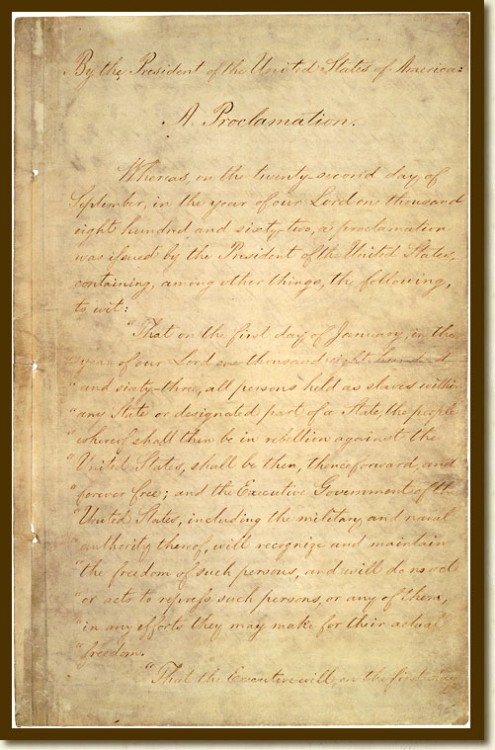Original Emancipation Proclamation Copy Sells For More Than $2 Million
Share
Explore Our Galleries
Breaking News!
Today's news and culture by Black and other reporters in the Black and mainstream media.
Ways to Support ABHM?
By Verena Dobnik, Associated Press
A rare original copy of President Abraham Lincoln’s Emancipation Proclamation sold Tuesday at a New York auction for more than $2 million.
It’s the second-highest price ever paid for a Lincoln-signed proclamation – after one owned by the late Sen. Robert Kennedy that went for $3.8 million two years ago.

The latest copy of the 1863 document ordering the freeing of slaves, which was auctioned at the Robert Siegel Auction Galleries, went to David Rubenstein, managing director of The Carlyle Group investment firm. The American seller remained anonymous.
The $2.1 million purchase price includes a buyer’s premium.
This price and the one for the Kennedy copy are the highest ever paid for the proclamation, reflecting a “growing appreciation for documents that capture the most important moments in our history,” said Seth Kaller, a dealer in American historic documents and expert on the Emancipation Proclamation; he’s handled eight signed copies.
The document will go on public exhibit somewhere in Washington, he said. The name of the institution is yet to be announced.
Lincoln signed the proclamation during the Civil War, freeing all slaves in states then in rebellion. The proclamation also provided a legal framework for the emancipation of millions of other slaves as the Union armies advanced.
Forty-eight copies were subsequently printed, with Lincoln signing all of them.
The president donated them to the so-called Sanitary Commission, a precursor of the modern Red Cross that sold the documents privately to provide medical care to Union soldiers.
Only about half of the 48 proclamation copies have survived.
Read more of the story here.
President Lincoln outlawed slavery after nearly three centuries.









Comments Are Welcome
Note: We moderate submissions in order to create a space for meaningful dialogue, a space where museum visitors – adults and youth –– can exchange informed, thoughtful, and relevant comments that add value to our exhibits.
Racial slurs, personal attacks, obscenity, profanity, and SHOUTING do not meet the above standard. Such comments are posted in the exhibit Hateful Speech. Commercial promotions, impersonations, and incoherent comments likewise fail to meet our goals, so will not be posted. Submissions longer than 120 words will be shortened.
See our full Comments Policy here.